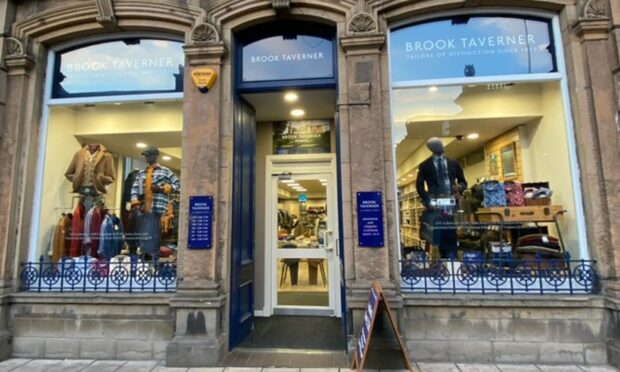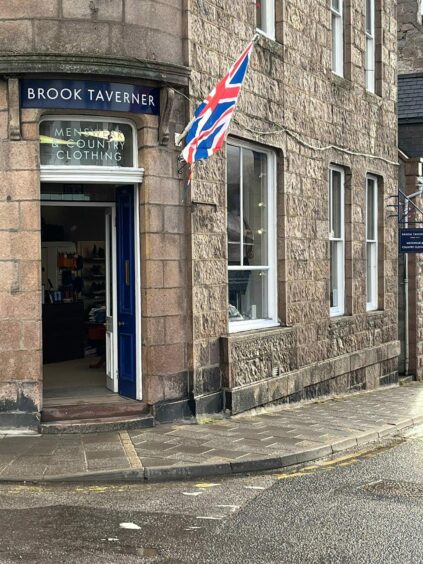Clothing retailer Brook Taverner says the middle-aged section of its typical recruitment market seems to have “disappeared completely” as the company struggles to find part-time staff for its Inverness and Ballater shops to work up to 30 hours a week.
What became known as “the great resignation” during the pandemic may have spilled over into a post-Covid world and accelerated the trend for those in their late 40s and 50s to retire after having tried out different lifestyles to a traditonal nine to five”.
“We seem to have lost the people who wanted to work for us before,” Brook Taverner retail concessions controller Jonathan Greenwood told The Press and Journal. “Of course before, we would have had people from 45 upwards, who have a settled life and are semi-retired – they seem to have disappeared completely.
“Maybe people are saying ‘we don’t need it’ but we are working on scraps.”
Recent data from the Office for National Statistics (ONS) appears to echo Brook Taverner’s plight and shows adults aged more than 50 years old in the labour market continue to drive the increase in inactivity.
In May to July 2022, there were 386,096 more economically inactive adults aged 50 to 64 years than in the pre-coronavirus pandemic period (December 2019 to February 2020).
The Over 50s Lifestyle Study (OLS) was designed to gather more information from adults aged 50+ to better understand their motivations for leaving work and whether or not they intend to return.
Drawing a blank to tempt staff
Brook Taverner has 10 shops across the UK employing 60-70 people, but despite hiring a recruitment agency, “exhausting” all the national and local job sites, as well as posting on Facebook, the business has drawn a blank trying to tempt new staff into its Inverness and Ballater branches.
Mr Greenwood conceded Brook Taverner did not “trip off the tongue” on the high street.
But he also said he was mystified how a company paying above the minimum wage and offering a bonus scheme is struggling to find staff.
The Inverness branch is on Academy Street, in the heart of the city, while Ballater benefits from its royal links to Balmoral.
Mr Greenwood added: “We are having to close two days a week as we can’t facilitate opening longer hours.”
“We tend to only be in market towns and trade on tourist areas to get that influx in the summer months. Hospitality has (maybe) soaked up a lot of people.”
Brook Taverner has only just signed a new lease for the Inverness store and an additional staff member would “at least help to increase sales”, Mr Greenwood said.
Ongoing recruitment struggle
Other pressures on the workforce include Brexit, with one Finnish employee returning home when Covid struck.
Retail and hospitality in particular are struggling to attract staff in the teeth of UK-wide issues with recruitment, despite strong economic headwinds afflicting the economy.
Brook Taverner’s Inverness shop enjoyed its best year in 2022, boosted by the closure of Debenhams in the Highland capital.
“When Debenhams closed, we picked up business,” Mr Greenwood said, adding: “But where have the staff gone?”
Key findings from the ONS study:
In the period from August 10 to 29, based on UK adults aged 50 to 65 years who have left or lost their job since the start of the coronavirus pandemic and not returned to work:
- The majority (66%) owned their homes outright
- Financial resilience varied by age
- More than half (55%) of those aged 60 to 65 years were confident or very confident their retirement provisions would meet their needs
- Age was also a factor when considering whether to return to work; the younger cohort were more likely to say they would consider returning to work (86% for those aged 50 to 54 years, 65% for those aged 55 to 59 years and 44% for those 60 to 65 years)
- Adults aged 50 to 59 years were more likely to report mental health reasons (8%) and disability (8%) as a reason for not returning to work
- Adults aged 50 to 59 years (14%) were also more likely to be currently looking for paid work, compared with adults aged 60 to 65 (6%)
- Among those who would consider returning to work (58%), the most important factors when choosing a paid job were flexible working hours (32%), good pay (23%) and being able to work from home (12%)
- Among those currently in work, access to support may be a factor in retaining the workforce with those who have never left the workforce more likely to have access to employer support than those who left work
- Around one in five (18%) said they were currently on an NHS waiting list for medical treatment




Conversation